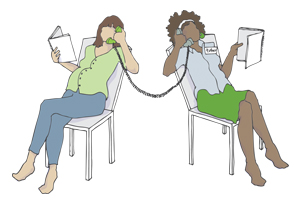The SMC focuses on managing emotions, relationships and trauma reactions during pregnancy. It's delivered by telehealth (video or phone) or in person.
If you are a new mom, we answer questions you might have in the "Fitting Room." Click on the menu item "For Clients" up top to access the "Fitting Room."

Q: I’m a mom-to-be who is also a trauma survivor. How can I participate in the Survivor Moms’ Companion program?
A: Thank you for your interest in Survivor Moms’ Companion (SMC). It is important for you to know, however, that SMC is not a “self-help” program.
Survivors who are pregnant or have just become moms learn how to manage thoughts and feelings about childhood trauma
as they develop a supportive relationship with an SMC tutor. Each SMC tutor is trained to teach you these skills, help you practice them, and assist you in processing the feelings that may come up during the learning process.
We understand that you may want and need this program now. We recognize that you may need support as you face the coming challenges. At this time, however, SMC is a brand-new intervention that is just being introduced in prenatal, early parenting, and mental health service settings.
As more tutors get trained and begin offer SMC tutoring around the nation, we will be better able to connect inquiring Survivor Moms to providers in their area. For the time being, we suggest that you ask your prenatal or early parenting service provider to visit our website at www.survivormoms.org or email [email protected] to learn more about becoming an SMC tutor.
For those who need support, we recommend a resource that connects survivors with therapists trained in helping those who have experienced trauma. It is not a “hot line” in that they do not provide mental health assistance themselves, but rather maintain a listing of trauma-informed therapists across the country. To reach them call 410-825-8888, EXT. 102 and leave a message.
Another source for finding support is Postpartum Support International. There is a place on their site to help connect parents to local providers who are trained to help with any mental health challenges you might be having: https://www.postpartum.net/get-help/locations/
You may also want to pursue reading material and explore the following resources for survivor moms. Note that some of these may have information that is triggering of past trauma for the reader, especially if some of the stories are similar to experiences you may have had.
The first resource is a book (“Survivor Moms: Women’s Stories of Birthing, Mothering, and Health after Sexual Abuse”) written by the creators of the SMC program:
https://www.amazon.com/Survivor-Moms-Stories-Birthing-Mothering/dp/1890446416
This is an article written by a “survivor mom” who discusses how parenting might be a “trigger” to symptoms of posttraumatic stress: https://themighty.com/2017/04/childhood-abuse-survivors-becoming-parents-what-to-know-about-ptsd/. The author of this article also co-authored a book on parenting with posttraumatic stress: http://www.joyellebrandt.com/non-fiction.
This is a review of a book written by survivors of childhood abuse who discuss their experiences of parenting: https://acestoohigh.com/2015/11/12/trigger-points-finally-a-book-for-parents-who-survived-child-abuse/
These two articles in professional journals highlight some of the experiences of survivors of childhood sexual abuse who are mothers and call attention to some of the parenting challenges that may exist for survivors:
https://www.ncbi.nlm.nih.gov/pmc/articles/PMC5933442/
https://www.ncbi.nlm.nih.gov/pmc/articles/PMC5088265/
